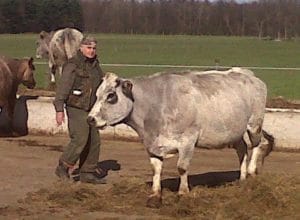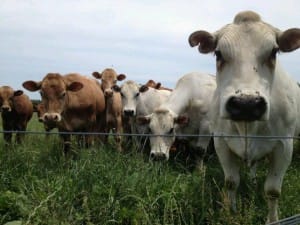[Note: A version of this story appeared in Cornucopia’s fall newsletter.]
By Elizabeth Wolf
Cows have four stomachs for a reason. There is purpose behind the snout of a hog. Squash, corn, tomatoes — they grow where they do, when they do, how they do, by design.

By Divine design, Dominic Marchese would say. This deeply spiritual, cigar-chomping cattleman raises beef as, he believes, God intended: 100% grassfed, calves never separated from their mothers, birth to processing off the same rotating pastures.
The proprietor of Manna Farms, near Farmdale, Ohio, didn’t come from a farming background, but an encounter with his wife’s Bible study class planted the seed. “I’ve come to find out it’s instilled in every man, the desire or need to grow something. I think that came from our Creator,” Marchese says. In 1972 he bought 131 acres of bare ground and started growing grain and dairying.
After milking cows for nearly 20 years, Marchese started a beef herd. “It was like dying and going to heaven,” he recalls. Beginning with registered shorthorn, in 1997 he introduced to the farm Piedmontese, an Italian breed he discovered from nearby Amish farmers who sold the meat to local hospitals. Famous for its “heart-healthy” meat, the Piedmontese is the only cattle breed known to carry a gene that increases tenderness and reduces fat—up to half that of skinless chicken. It cooks faster than conventional beef, too.
From 1973 to ’75 Marchese used herbicides on his farm but never felt right about it. “I started reading Rodale, Mother Earth—of course, I was the nutcase in the neighborhood. They’d laugh at my corn because it had weeds in it,” he recalls. “Spraying just didn’t seem right when all you had to do was rotate your crops rather than kill all the microbes in the soil.” Manna Farms has been certified organic since 1976 and solely grassfed since 1999.
As the organic market grew, challenges followed opportunities. Marchese must compete with “natural” beef producers that do not—and legally need not—verify their claims. “They might still be spraying Roundup around their fences, giving their calves antibiotics, using GMO feed—who’s going to know?” Marchese asks. Not consumers, who nevertheless will pay nearly as much for “natural” as for organic.
Yet Marchese’s costs are significantly higher. While conventional producers process their cattle at a standard, nearby slaughterhouse, Manna Farms absorbs $250 each trip to transport live cows to a certified organic processing facility five counties away.

Piedmontese cattle
Organic feed is another huge expense—especially when you have up to 60 head and your calves stay a full two years with their mothers, as Marchese’s do. That’s 24 months to market, as opposed to just 14 to 18 for conventional cattle. Breed is an often overlooked factor in organic livestock production; factory farm breeds simply cannot be expected to perform as well in organics.
Then there’s competition from organic imports from Uruguay, Argentina and other distant countries. Astonishingly, because of price manipulation this beef costs American consumers—even Marchese’s neighbors—less than the local, premium products of Manna Farms.
Because of these dubious marketplace pressures, Marchese favors regulatory absolutes in beef production. “How can you be in between?” he asks. “You’re either certified organic or you’re not. All they need to do is get rid of the word ‘natural.’ The government could fix this but they don’t.”
It took many years for organic pioneers like Manna Farms to create a market. Now there’s so much demand for grassfed certified organic beef Marchese has a waiting list. “I sell no more than 18 head a year,” he explains. Most of his customers are referrals from a local CSA who buy quarters and halves. In addition he sells meat to four restaurants and prepackaged ground beef direct on the farm.
To meet growing consumer demand, Marchese is trying to establish an organic beef producers cooperative in the area. “I think many would like to farm organically but they’re afraid of being ridiculed,” he reflects, “or they think they have to do the bigger is better.” It is a long process. “Grassfed takes years to prepare. You can’t just jump into it.”
But Manna Farms’ reason for being goes far beyond profitability: “I’ve never watched a U-Haul follow a hearse,” says Marchese. “You can’t take it with you. When you’re certified organic, it’s as holistic as possible.”
Adds Marchese: “It’s been a ride — ‘sideways’ — because we’ve never stopped building and growing these past 41 years. I was a young 29-year-old with four young kids building a home on those open 131 acres. The only farm equipment I had was a rototiller from my garden in town.
Now there’s 10 grandkids and some 248 acres of protected-in-perpetuity farmland, signed in a conservation easement with Western Reserve Land Conservancy, preserved forever for agriculture alone. That would be the closest thing to a U-Haul following the hearse that one could then actually leave to the Planet. But will future farmers keep it certified organic when the freely used buzzwords ‘natural raised’ pays the same?”
MANNA FARMS is located in Farmdale, Ohio and can be found online at www.mannafarms.com or by phone at (330) 924-5200.

